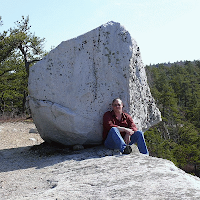From the start of the article:
- JOHN HOLDREN, science adviser to President Barack Obama, is a clever man. But when it comes to the science of communication, he can say some dumb things. In January, Holdren welcomed the prospect of climatologists being called to testify before Congress: "I think we'll probably move the opinions of some of the members of Congress who currently call themselves sceptics, because I think a lot of good scientists are going to come in and explain very clearly what we know and how we know it and what it means, and it's a very persuasive case."
Well, of course it's not that simple. The article claims, and I concur, that all of us "filter and interpret knowledge through our cultural perspectives, and these perspectives are often more powerful than the facts." Obvious examples of this are the opposition to the concept of biological evolution from many Evangelical Christians and the misguided belief that vaccines cause autism by many on the other side of the political spectrum. There's even evidence that education may strengthen our cultural biases, not weaken them as you might expect.
The proposed solution? If you want to change someone's mind on a controversial issue, find someone they identify with to make the argument. In other words, don't expect Al Gore to change a Conservative's mind on climate change. An Inconvenient Truth, with its not-so-subtle digs at George Bush, would be rightly viewed as having an ideological bias (even if the overall message was scientifically-based). Don't expect an atheist will be able to convince Evangelical Christians that young-Earth creationism is not science. Of course they don't believe God created man, they would think, the don't even believe in God.
To convince political conservatives that climate change is real, one needs to first repect their ideological beliefs, even if you don't share them and find conservative scientists to discuss the issue (they do exist). Similary, Christian scientists (not the Mary Baker Eddy type!) are the ones best able to convince other Christians that young-Earth creationism is nonsense.
While I understand the necessity of talking about "selling science", it also makes me somewhat uncomfortable. Many people in this country already hold to a type of postmodernism that claims scientific ideas are purely human constructs with no objective reality. I mostly reject that idea as, I think, do most practicing scientists. Scientific "truth" does not belong to the person making the cleverest argument as you might see on a Fox News type scenario of two talking heads arguing climate change as if all opinions on the issue are equally valid. They're not. The opinion of an atmospheric scientist with 30 years of research experience and peer-reviewed publications does not have the same weight as that of a state senator with a degree in business when it comes to climate change.


No comments:
Post a Comment